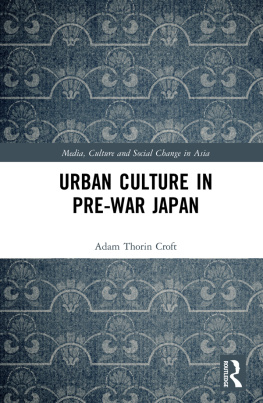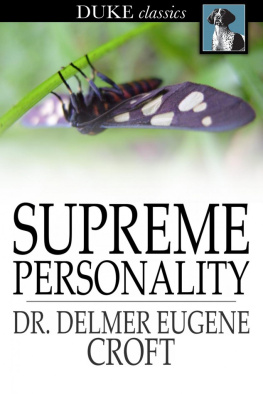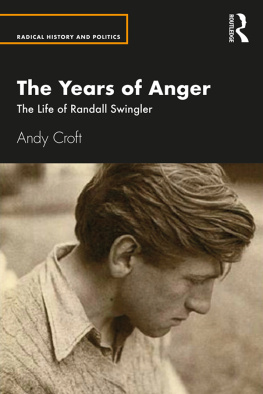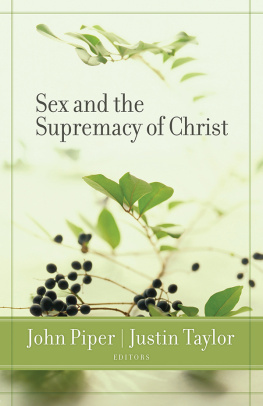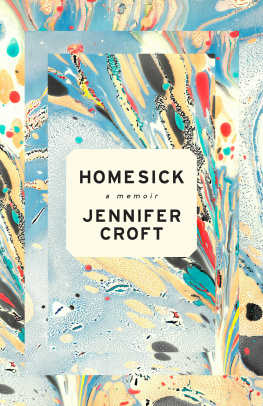THE WILD HILLS
by
Rupert Croft-Cooke

Contents
Chapter One
SalpertonNot Sapperton
[1]
On New Years Day 1934 I drove my small Singer car from Thanet to the stone-built cottage I had found for myself in an isolated hamlet of the Cotswolds. I had been with my family for Christmas and was returning to the life and home I had chosen and already held dear, though I liked to think of myself as an exile in Gloucestershire from the leafy fertility of my native Kent.
The car was not so much open as lacking a hood. I had bought it for ten pounds from a young mechanic who had nursed its old engine well, and this hummed away without protest or interruption as I covered the lonely miles from Oxford to Witney, past Burford and through Northleach.
I was thirty years old and believed myself a very enviable young man. Five over-written and immature novels of mine had been published and a sixth which I considered far superior to anything I (or almost any other young writer) had done, was to come out in March. From these and other literary efforts, supplemented with some dealing in old books, I made a living of from 250 to 300 a year which in those undemanding days was sufficient to provide me with my small house, this old serviceable motor-car, the domestic services of the village bakers son, enough to eat and beer in a pub at night. I will not say this was all I wanted, but after periods of sharper poverty it seemed by comparison munificent.
Besides, there was always the hope, very lively throughout those pre-war years, that the next novel, or the next or the next, would miraculously start selling in immense numbers and make me rich. I should have laughed at the notion that I might continue to earn a living by writing, even in time an adequate one, without ever hitting the jackpot. I remembered how a bookseller and playwright named Ernest George who was also born under Gemini had once told me that to us of that sign the very direst things never happened, every disaster we met might have been worse, but that we missed the great successes, too. It seemed merely quaint at the time and I considered astrology (as I do still) a picturesque superstition. This pleasant belief in each successive forthcoming book of mine as a potential best-seller made the poverty of the moment easily endurable.
Nor was it a restrictive poverty. Without that cruel and limiting thing a small irrevocably fixed income, I never felt poor. There was always the belief that I could earn more money in an emergency, that debts could be somehow met, that if I spent the five pounds in my pocket prodigally I could find a way to replace them, that periods of economic crisis were transient, and I rarely made small sacrifices. I had already managed to travel pretty widely in South America and Europe and should see a good deal more of the world without achieving the fanciful sudden wealth I pictured. My way of living, providing for the house and so on, might be highly erratic, might know periods of difficulty, but was not parsimonious.
Moreover, I had vigorous good health and immense gusto. I was passionately interested in things and people, and particularly in this new world I had found west of Oxford. I delighted in having a small home of my own and being able to maintain it by doing the work I wanted to do. I felt no menace in world events and no fear of personal tragedy. Illness, accidents, physical suffering, the loss of sight or hearing, imprisonment, hunger, the horrors of war, human loss, madness, paralysis, utter loneliness, chronic lassitude and boredom, persecution, torture, deathall these I may have recognized as existing in the world but for me at that time and in that place they had no meaning. I had a childs trust in life, a boys self-confidence and a mans resolution. That New Years Day was the beginning of an epoch of fulfilment and felicity and of horizons which widened enticingly whichever way I turned.
[2]
I have told (in The Purple Streak) how I found the village of Salperton which at that time housed less than fifty people, a group of cottages built in the seventeenth century for the dependents on a great estate, and how that estate had dwindled to a gloomy large house where the widow of a Birmingham iron-master named Harter and her son sought to keep up appearances. They were converting several of the labourers cottages in the village to the use of those who demanded a slightly higher standard of living, bathrooms, running water, electricity, and I was the first outsider to rent one. It was called the Long House because its rooms were in a single line and it looked long as cottages go.
Salperton had no pub, being one of five tiny groups of habitations within two miles of the Puesdown Inn on the main London to Cheltenham road, and it shared a parson with two other villages. It was more than six miles from any shop and twelve from a town, Cheltenham. It was in fact in one of the loneliest areas of Southern England. But in the two or three months I had lived there I had felt no apprehensions about its solitude. The house itself, a house of my own, achieved by my own literary efforts, would have been enough, wherever it was, and this was truly attractivea long, low cottage built of Cotswold stone in Queen Elizabeths reign, roofed with the curly grey tiles of the region, with stone-mullioned leaded windows and stone or tiled floors. It had a large open fire-place with a mighty oak beam over it and its ceilings had more rough-hewn oak. It was solid as a rock temple, cool in summer, snug in winter, and I had enough books to line one of the long walls of the only sitting-room. For me it was a home to be proud of and I took positive and undiminishing pleasure in it.
I was proud, too, of my discovery in the village bakers son, of a naturally talented cook. The youngest but one of a large struggling family, he had been from childhood his mothers favourite and had learned from her to cook for them all during her long periods of ill-health. The father rented a small bakehouse near my home, and alone and unaided baked each day for a hundred or so families in the surrounding villages, delivering his good bread in a small van. But there was such poverty in this agricultural area that his life was a long tussle with debts, his customers debts to him and his own to the flour-mills for, a kindly man, he could never refuse credit where there was want. Eric had been brought up, like most boys in Gloucestershire of those days, to a hand-to-mouth existence of hard work. But his mother had learned, or inherited, an art which is less rare in rural England than foreigners suppose, and Eric was a cook of quite extraordinary ability and adaptability, as I was to find. He was then about sixteen, fair-haired with large rather shallow blue eyes. He had come to me when I first moved in and asked if he could work for me for ten shillings a week and his keep. If he had said twelve-and-six I should not have dared commit myself out of my only certain earnings of less than five pounds. He ran the house vigorously, noisily, cheerfully, and cooking was his pride.
I had made other additions to the household since my arrival in the late autumn. A wealthy young man with a large house in Kent had suddenly decided that all his pets should be white and had therefore given me Dingo, an Alsatian pup which had turned a rich tawny colour as it grew, and I had bought as mate for him a fine sensitive almost black Alsatian bitch. The same young man had wanted only white peacocks and had sent me by rail in a huge crate a magnificent peacock and his mate. These I called Guy and Pauline and they strutted imperiously about the little square of lawn at each end of my house or sat high on walls with Guys tail hanging down iridescently. I had an orchard in front of my house through which a stream ran so I had ornamented this with a family of Khaki Campbell ducks. But most unaccountable of all in her ways was Faustine, a young nanny-goat who had to be prevented from eating all the bark from the ancient and mostly barren fruit trees in the orchard. I had bought her in a pub for half a crown. There was also, least obrusively, yet most self-confidently, a sandy kitten, born in a barn, of doubtful parentage and known as Tess. This large family of creatures with their names derived from books were deliberately left as far as possible to their own recreations and habits and were wholly undisciplined. Only Dingo, the most powerful and ferocious of them, showed as time passed that he could not live except under human mastery.



